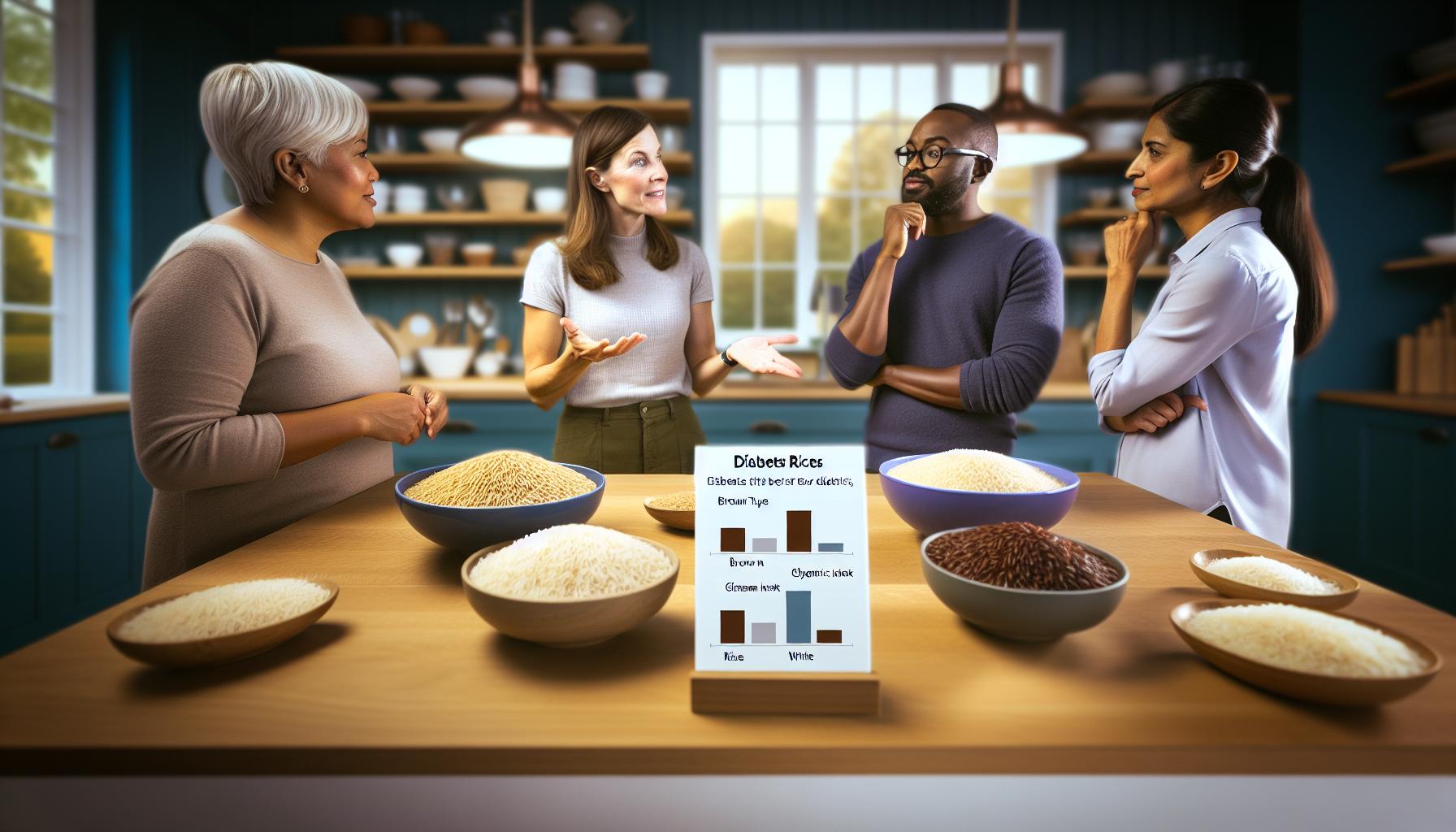For many living with diabetes, dietary choices can feel overwhelming, especially when it comes to beloved beverages like café con leche. Did you know that enjoying your favorite coffee drink can fit into your diabetes management plan? This guide aims to navigate the nuances of caffeine and dairy for diabetics, empowering you to make informed choices without sacrificing enjoyment. Understanding how these ingredients affect blood sugar levels and overall health is essential for maintaining a balanced lifestyle. Whether you’re a coffee aficionado or simply looking for ways to spice up your daily routine, our comprehensive insights will address your concerns and help you savor your café con leche with confidence. Let’s explore how to incorporate this delicious drink into your daily diet while prioritizing your health and well-being. Join us on this journey to better understand diabetes management and enjoy the little pleasures in life!
Uncovering the Benefits of Coffee for Diabetics
Drinking coffee is more than just a pleasant ritual; it can also confer several health benefits, particularly for individuals managing diabetes. Numerous studies indicate that regular coffee consumption may be linked to a lower risk of developing type 2 diabetes. The mechanisms underlying this connection are not entirely understood but are believed to involve caffeine and other components found in coffee, which may enhance insulin sensitivity and reduce inflammation.
Moreover, the antioxidants present in coffee can help mitigate oxidative stress, a common concern for those with diabetes. This reduction in oxidative damage is crucial for maintaining overall health, particularly in managing chronic conditions. Additionally, some research suggests that coffee drinkers have a lower incidence of cardiovascular complications, a significant concern for many individuals with diabetes due to their increased risk for heart disease.
While coffee can be a healthful addition to a diabetes-friendly diet, it’s essential for individuals to monitor the overall impact on their blood sugar levels. Pairing coffee with low-fat milk or alternative milk options can make it not only delicious but also a more balanced choice, as these options can provide nutrients without causing significant spikes in glucose. Regular consultations with healthcare professionals ensure that coffee fits comfortably into your daily routine while remaining compatible with your diabetes management plan.
Selecting the Right Milk Options for Diabetes

Selecting the right milk options can significantly influence both the enjoyment and healthfulness of your coffee, especially for those managing diabetes. With a variety of choices available, it’s essential to choose options that align with your dietary goals and help maintain stable blood sugar levels. For instance, low-fat milk is a popular choice due to its balanced nutrition profile, providing protein and calcium while keeping calories and saturated fat relatively low. This option can be satisfying without causing substantial spikes in blood sugar when enjoyed in moderation.
Alternatively, plant-based milk alternatives can offer unique benefits as well. Unsweetened almond milk, soy milk, and oat milk are excellent picks that are often lower in carbohydrates than regular dairy milk. Notably, almond milk has fewer calories and carbs, making it a great low-calorie option. However, fortified varieties can provide essential nutrients like calcium and vitamin D, which are crucial for bone health. Be cautious with flavored or sweetened versions, as they may have added sugars that can affect your blood sugar.
Considerations for Milk Choices
When selecting milk, consider the following practical tips:
- Check Labels: Always read nutrition labels for carbohydrate content. Aim for options with fewer than 5 grams of carbs per serving.
- Fortification: Look for fortified plant-based milks that contain calcium and vitamin D for supplementing nutrients.
- Texture and Taste: Choose a milk that complements your coffee well. Creamier alternatives may enhance the overall flavor of your drink.
- Portion Control: Be mindful of how much milk you add to your coffee to keep overall calorie and carb counts in check.
Ultimately, the right milk option can elevate your coffee experience while supporting your diabetes management. Remember, personal preferences and individual responses to different milk types can vary, so it’s beneficial to experiment and see what works best for you. Regular discussions with healthcare professionals can help tailor these choices to fit seamlessly into your diabetes management plan, ensuring that your coffee ritual remains both enjoyable and health-conscious.
How Coffee Affects Blood Sugar Levels
Regular coffee consumption may play a complex role in blood sugar management, making it a topic of considerable interest for those living with diabetes. Evidence suggests that coffee may influence insulin sensitivity, which can affect how glucose is processed in the body. Interestingly, some studies indicate that moderate coffee consumption might be associated with a reduced risk of developing type 2 diabetes. This could be due to the presence of antioxidants and other bioactive compounds found in coffee, which may help in improving metabolic health.
However, it’s important to consider individual reactions to coffee, especially regarding blood sugar levels. The caffeine in coffee can impact some people differently, potentially causing a temporary increase in blood sugar levels. This response can vary widely among individuals; while some may experience a spike, others might find that coffee has little to no effect on their glucose control. For those who are sensitive to caffeine, it might be beneficial to opt for decaffeinated coffee or to consume caffeinated coffee in moderation.
To maximize the benefits of coffee while maintaining stable blood sugar levels, there are several practical approaches to consider. One strategy is to monitor how your body responds to coffee, particularly around meal times. Keeping a log of blood sugar levels before and after coffee consumption can provide valuable insights into your unique response. Additionally, pairing coffee with a balanced meal or snack containing fiber and protein can help mitigate any potential negative effects on blood sugar.
Key Tips for Coffee Consumption:
- Monitor Your Response: Track your blood sugar levels to see how coffee affects you personally.
- Eat Balanced Meals: Enjoy coffee with meals that include fiber and protein to promote better blood sugar control.
- Consider Decaf: If you’re sensitive to caffeine, explore decaffeinated options.
- Research Variety: Explore different coffee types and preparation methods, as these can also affect how coffee influences blood sugar.
In summary, while coffee can be enjoyed by many individuals managing diabetes, understanding its effects on blood sugar levels is crucial. Regular conversations with healthcare professionals can help tailor your coffee consumption to fit within your overall diabetes management plan, ensuring that your enjoyment of coffee aligns with your health goals.
Incorporating Coffee with Milk into Your Diet

can be a delicious and comforting way to enjoy your morning routine, all while being mindful of blood sugar management. For many people with diabetes, finding the right balance in their diet is essential, and understanding how different components interact is key. Coffee itself, rich in antioxidants and potential metabolic benefits, can be enhanced by the addition of milk, which provides calcium, protein, and other nutrients. However, it’s important to be mindful of your choices when it comes to the type of milk and any added sweeteners.
When selecting milk for your coffee, consider options that align with your dietary needs. Full-fat milk may be higher in saturated fats, while low-fat or skim varieties offer a lighter option that can still provide the creamy texture many coffee lovers enjoy. If you’re lactose intolerant or seeking a dairy alternative, plant-based milks like almond, oat, or soy can be good choices too. Just be aware that some plant-based milks can contain added sugars, which may influence blood sugar levels. Look for unsweetened versions whenever possible to keep your carbohydrate intake in check.
Additionally, think about how you incorporate coffee with milk into your daily meals. Whether it’s a morning boost alongside breakfast or an afternoon treat with a snack, pairing your beverage with foods rich in fiber and protein will help stabilize blood sugar levels. For example, enjoying a cup of coffee with milk alongside whole-grain toast or a nut butter can create a balanced meal experience. Also, experimenting with how much milk you add can help you find a balance that satisfies your palate without significantly increasing your calorie or carbohydrate intake.
Lastly, keep in mind the importance of moderation. While coffee with milk can be a delightful part of your nutrition plan, it’s wise to observe how your body responds. Keeping a log of your blood sugar levels before and after consumption can help you understand any fluctuations, informing your choices for future meals. As always, consult your healthcare professional for personalized advice, especially since they can suggest specific dietary adjustments based on your overall health and diabetes management plan. Remember, the aim is to enjoy your coffee while also empowering yourself to make choices that support your health.
Delicious Recipes for Coffee with Milk

Indulging in a warm cup of coffee with milk can be a delightful way to start your day or recharge in the afternoon, especially for those managing diabetes. Here are some delicious and diabetes-friendly recipes that incorporate coffee and milk, allowing you to enjoy this comforting beverage while keeping your blood sugar in check.
Creamy Cinnamon Coffee
Start your morning off with a flavorful twist on your regular coffee. This recipe combines the richness of coffee with the health benefits of cinnamon, which may support blood sugar levels.
- Ingredients:
– 1 cup brewed coffee
– 1/4 cup unsweetened almond milk (or your choice of milk)
– 1/2 teaspoon ground cinnamon
– Sweetener of choice, if desired (consider stevia for minimal impact on blood sugar)
- Instructions:
1. Brew your favorite coffee.
2. In a small saucepan, heat the almond milk over low heat until warm.
3. Stir in the cinnamon and sweetener, mixing well.
4. Pour the mixture over brewed coffee and enjoy!
Iced Vanilla Latte
Perfect for a warm day, this iced vanilla latte uses unsweetened vanilla extract for flavor without adding sugar.
- Ingredients:
– 1 cup cold brewed coffee
– 1/2 cup unsweetened soy milk
– 1/2 teaspoon pure vanilla extract
– Ice cubes
– Optional: a sprinkle of cocoa powder or ground nutmeg for garnish
- Instructions:
1. Fill a glass with ice cubes.
2. Pour in the cold brewed coffee.
3. Add soy milk and vanilla extract, stirring to combine.
4. Garnish with a sprinkle of cocoa powder or nutmeg if desired.
Mocha Avocado Smoothie
This recipe packs nutritious ingredients that can enhance your morning coffee routine while providing healthy fats and fiber for sustained energy.
- Ingredients:
– 1/2 ripe avocado
– 1 cup brewed coffee (cooled)
– 1/2 cup unsweetened almond milk
– 1 tablespoon cocoa powder
– Sweetener of choice (try a low-carb sweetener)
– Ice cubes
- Instructions:
1. In a blender, combine avocado, coffee, almond milk, cocoa powder, and sweetener.
2. Add ice cubes and blend until smooth.
3. Enjoy as a refreshing and filling morning beverage.
Tips for Creating Your Own Recipes
When crafting your coffee beverages, consider these key points:
- Choose Unsweetened Milks: Opt for unsweetened variations to avoid added sugars.
- Experiment with Flavors: Use spices like nutmeg, ginger, or turmeric for added flavor and health benefits.
- Monitor Portions: Keep an eye on portion sizes and overall carbohydrate intake to maintain stable blood sugar levels.
Each of these delicious recipes offers a way to enjoy coffee without compromising your health goals. Sharing these ideas with friends and family not only encourages a supportive atmosphere but also inspires creativity in dining choices-all while keeping diabetes management at the forefront. Always remember to consult your healthcare professional for personalized dietary advice tailored to your individual diabetes management plan.
Understanding Caffeine and Insulin Response
Caffeine, one of the main components of coffee, has a complex relationship with insulin response and blood sugar levels, making it an intriguing topic for those managing diabetes. For many, coffee can boost alertness and energy levels, but it’s important to consider how the caffeine might affect insulin sensitivity and glucose control. Studies suggest that caffeine can temporarily increase blood sugar levels in some individuals, potentially making blood sugar management more challenging after consumption.
When caffeine enters the bloodstream, it can affect how insulin works. In some cases, caffeine might inhibit insulin sensitivity, which means the body becomes less efficient at using insulin to lower blood sugar. For individuals with diabetes, this could lead to higher blood sugar levels following coffee consumption, especially when it’s consumed in large amounts or in a sweetened form. Thus, those managing diabetes should closely monitor their blood sugar levels after drinking coffee to understand how their body responds.
To maintain good blood sugar control while enjoying coffee, consider these practical tips:
- Moderation: Limit your intake to 1-2 cups of coffee per day to avoid potential spikes in blood sugar.
- Pair with food: Consuming coffee with a meal can help mitigate blood sugar spikes, as food slows down absorption.
- Choose wisely: Opt for black coffee or coffee with unsweetened milk options, and avoid sugary creamers and flavored syrups that can drastically increase carbohydrate intake.
- Monitor your levels: Regularly check your blood sugar before and after consuming coffee to gauge its impact on your body.
By staying informed and proactive, individuals with diabetes can enjoy their coffee without compromising their health. Always consult with a healthcare professional for tailored advice to ensure you understand how caffeine fits into your overall diabetes management plan. Knowledge and monitoring are key to enjoying the benefits of coffee while keeping blood sugar in check.
The Role of Fiber in Your Coffee Choice
Incorporating fiber into your coffee choice can transform not just the taste, but also the health benefits of your beverage, making it a smart strategy for those managing diabetes. While coffee itself is not a significant source of fiber, you can enhance its nutritional profile by combining it with fiber-rich ingredients or additives. For example, when adding milk to your coffee, consider selecting plant-based options, such as almond milk, soy milk, or oat milk, which often contain added fiber. These options can help to promote digestive health and may contribute to better blood sugar control.
Fiber plays a crucial role in diabetes management by slowing down the absorption of sugar in the bloodstream. This moderated absorption can lead to more stable blood sugar levels after meals. By choosing a coffee companion like a fiber-enriched non-dairy milk or incorporating fiber-rich ingredients like chia seeds or ground flaxseed into your drink, you not only enhance the coffee’s texture and flavor but also benefit from the added fiber. For instance, adding a tablespoon of flaxseed to your morning coffee can provide around 3 grams of fiber, which is a wonderful way to boost your intake while enjoying your favorite drink.
When crafting your personalized coffee, keep in mind the balance between taste and nutritional value. You might also explore coffee blends that utilize beans from high-fiber sources or even try brewing methods that involve filtration techniques that retain more nutrients. This can be particularly beneficial if you’re facing challenges in maintaining your dietary fiber levels throughout the day.
Understanding the role of fiber in your coffee helps empower you to make informed choices that positively impact your diabetes management. Always remember to consult your healthcare professional when integrating new foods or ingredients into your diet, ensuring that your choices align with your overall health goals.
Managing Portion Sizes: Best Practices
Managing portion sizes in your coffee consumption is crucial, especially for individuals managing diabetes. Understanding how much coffee to enjoy while maintaining your health can significantly impact your blood sugar levels. For instance, it’s recommended to limit coffee intake to about 2 to 3 cups per day, which is generally considered safe for most adults. However, you should always pay attention to how your body responds, as sensitivity to caffeine can vary widely among individuals.
One key aspect of managing portion sizes is being mindful of the added ingredients in your coffee. Sugars, flavored syrups, and full-fat creamers can contribute hidden calories and carbohydrates that may spike blood sugar levels. Instead, opt for healthier alternatives. You could use unsweetened almond milk or a sprinkle of cinnamon for flavor without added sugar. Keeping your portion sizes in check allows you to enjoy your coffee while maintaining better control over your blood sugar.
Here are some practical tips to help manage portion sizes effectively:
- Use a standard measuring cup: Rather than eyeing it, measure your coffee and any added ingredients. This practice fosters better understanding and control over your intake.
- Gradual increments: If you’re used to larger sizes, try gradually decreasing your portion size and observe how you feel. This method allows your body to adjust.
- Hydration balance: Pair your coffee with water to balance your intake. This can help you feel fuller and may naturally reduce your coffee portion.
- Mindful sipping: Take your time to sip your coffee. This approach not only enhances your enjoyment but can also help you notice fullness cues, reducing the likelihood of overindulgence.
Always remember, while portion control is vital, the quality of your coffee ingredients matters just as much. High-fiber additions like chia seeds, or switching to lower-calorie milk alternatives can enhance your coffee’s health profile without compromising taste. As always, it’s best to discuss your coffee habits and how they fit into your overall diabetes management plan with your healthcare professional, ensuring alignment with your personal dietary goals.
Myths and Facts About Coffee Consumption
Understanding the complex relationship between coffee and diabetes is often clouded by myths and misconceptions. One prevalent myth is that coffee consumption is entirely harmful for diabetics. In reality, moderate coffee intake might even provide benefits, such as improved insulin sensitivity as evidenced by some studies. It’s crucial to distinguish between different types of coffee and their effects, especially when discussing added ingredients like sugar or cream, which can negate any potential benefits.
Another common misconception is that caffeine should always be avoided by diabetics. While it’s true that caffeine can cause a temporary spike in blood glucose levels, research indicates that regular coffee drinkers may develop a tolerance to these effects. The variability in individual responses to caffeine highlights the importance of personal observation; tracking how your body reacts after enjoying coffee can lead to healthier choices tailored to your needs.
Myths About Coffee and Diabetes
- Myth: Coffee raises blood sugar levels for everyone.
Fact: The response varies widely among individuals; some may experience increased blood sugar, while others may not notice any significant changes. - Myth: All coffee is recognized the same.
Fact: The way coffee is prepared-such as with sugar, flavored syrups, or cream-can significantly alter its impact on blood sugar levels. - Myth: Decaffeinated coffee is completely safe.
Fact: While decaf coffee generally contains less caffeine, it can still affect blood sugar levels depending on how it’s consumed.
Ultimately, separating fact from fiction is essential for managing diabetes effectively. Consulting with a healthcare professional can shed light on how coffee fits into your overall diet plan. They can help guide you through informed decisions based on your unique health profile, ensuring a balanced approach to enjoying coffee without compromising your diabetes management goals.
Tips for Monitoring Blood Sugar After Coffee
Monitoring blood sugar levels after enjoying coffee is an essential practice for individuals with diabetes, especially since the beverage has varying effects on blood glucose depending on factors like individual tolerance, consumption method, and added ingredients. Many individuals might be surprised to learn that coffee can actually influence their blood sugar response. To empower your diabetes management, here are some practical tips for effectively monitoring your blood glucose after consuming coffee.
First and foremost, it’s advisable to check your blood sugar before and after drinking coffee. This will help you understand how coffee affects your body specifically. Some might experience a spike in blood sugar shortly after consumption, while others may not see significant changes. A common suggestion is to measure your blood glucose levels 1 to 2 hours after drinking coffee to capture its peak impact. Keep a log of these readings alongside notes on your coffee type (e.g., regular, decaf, with milk, or sweetened) to detect patterns.
Consider the ingredients you add to your coffee. Adding milk or sugar can change the beverage’s carbohydrate content, which in turn can affect your blood sugar levels. When you’re monitoring your response, try to keep your coffee consumption consistent; for example, always drink it black or with the same quantity of milk. This consistency helps in accurately assessing how specific variations affect your blood sugar.
Another effective strategy is to pair your coffee with a balanced snack or meal that includes protein and healthy fats. This approach helps mitigate potential spikes in blood glucose levels caused by caffeine. Additionally, maintain hydration by drinking water alongside your coffee, which can help your body manage blood sugar levels more effectively.
Lastly, always consult with your healthcare professional about your coffee consumption and any observations you make while monitoring your blood sugar. They can provide personalized advice and modifications tailored to your health needs, ensuring that your coffee habits align with your overall diabetes management plan. Embracing coffee as a part of your diet can be beneficial, and with careful monitoring and consultation, you can enjoy it responsibly and in harmony with your health goals.
Consulting Your Healthcare Professional: A Must
Having diabetes does not mean you have to give up your favorite beverages entirely; however, making informed choices is essential. Consulting your healthcare professional is vital in developing a personalized approach that aligns with your specific health needs and diabetes management plan, especially when incorporating coffee with milk into your diet. Sharing your goals, preferences, and any experiences you’ve had with coffee consumption allows them to provide tailored guidance that considers your blood sugar response to this popular beverage.
When discussing coffee consumption with your healthcare provider, be open about the details-such as the type of coffee you enjoy, whether you add milk, and any sweeteners you may use. This information helps your provider assess how these ingredients interact with your diabetic management plan. They can explain potential effects on blood sugar levels, share evidence-based research on coffee’s role in diabetes, and address any concerns you might have regarding hydration, energy levels, or caffeine sensitivity.
Keep in mind that every individual reacts differently to coffee. Factors such as the type of dairy added, the quantity consumed, and personal metabolic responses can all influence blood glucose levels. This is why adjustments made without professional input can lead to unexpected outcomes. Your healthcare professional may recommend checking your blood glucose levels at specific times after coffee consumption to help you learn how your body reacts, ultimately enabling you to enjoy your coffee habits confidently.
Additionally, consulting with a registered dietitian or certified diabetes educator can further enhance your understanding of integrating coffee with milk into your meals. These professionals can provide you with strategies for making healthier choices, ensuring you still enjoy the pleasures of your favorite beverages without compromising your health. Remember, diabetes management is a team effort, and your healthcare professional should be your first resource for evidence-based strategies that cater to your lifestyle and preferences.
Faq
Q: Can diabetics drink coffee with milk?
A: Yes, diabetics can drink coffee with milk, as long as they choose low-fat or unsweetened alternatives. Monitor your blood sugar levels to see how your body reacts and adjust your milk choice accordingly. For detailed insights, refer back to our section on “Selecting the Right Milk Options for Diabetes.”
Q: What is the best time for diabetics to drink coffee?
A: Diabetics may benefit from drinking coffee in moderation during the morning, as it can enhance alertness without significantly impacting blood sugar levels. Pair it with a balanced meal to stabilize glucose levels. For more tips, visit our section on “Tips for Monitoring Blood Sugar After Coffee.”
Q: Does coffee with milk raise blood sugar levels?
A: Coffee with milk can raise blood sugar levels, particularly if it contains added sugars or high-fat dairy. It’s best to monitor your response and consider low-glycemic options to minimize spikes. Learn more in “How Coffee Affects Blood Sugar Levels.”
Q: Are there any health risks for diabetics drinking coffee?
A: While moderate coffee consumption can be safe, excessive caffeine may lead to increased insulin resistance and anxiety. It’s important to consult your healthcare professional for personalized advice on coffee consumption. Check “Consulting Your Healthcare Professional: A Must” for more guidance.
Q: What milk alternatives are best for coffee when managing diabetes?
A: The best milk alternatives for coffee include unsweetened almond milk, soy milk, or low-fat cow’s milk, which generally have lower calories and carbohydrates. For recipes incorporating these options, see our section on “Delicious Recipes for Coffee with Milk.”
Q: How can coffee consumption affect diabetes management?
A: Coffee can impact diabetes management positively by improving mood and alertness. However, individual responses vary, so consistent monitoring of blood glucose after consumption is essential to prevent potential spikes. More insights can be found in “Understanding Caffeine and Insulin Response.”
Q: Can coffee help with weight management for diabetics?
A: Coffee may aid in weight management due to its metabolism-boosting effects. However, adding high-calorie creamers or sweeteners can counteract these benefits. For tips on portion sizes, refer to our section on “Managing Portion Sizes: Best Practices.”
Q: What sugars and additives should diabetics avoid in their coffee?
A: Diabetics should avoid adding sugar, flavored syrups, and high-calorie creamers in their coffee. Instead, opt for natural sweeteners like stevia or sugar-free syrups. Visit “Myths and Facts About Coffee Consumption” for more facts about coffee and sugar.
In Retrospect
As you embrace the knowledge from “Un Diabético Puede Tomar Café con Leche: Guía Completa,” remember that managing diabetes involves making informed choices that align with your lifestyle. Incorporating coffee with milk can be a delightful addition, but always consult your healthcare professional to ensure it fits within your personalized dietary plan. For more insights, explore our articles on balanced meal planning and the best snacks for diabetics.
Don’t let diabetes limit your enjoyment of life-take action now! Join our community newsletter for regular tips on daily management and discover products designed specifically for your needs. Share your experiences in the comments below; we love hearing from you! Together, we can navigate the challenges of diabetes management while celebrating every victory along the way. Keep exploring our resources to empower your journey toward better health-you’re not alone in this!












